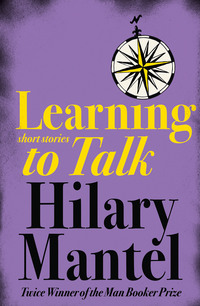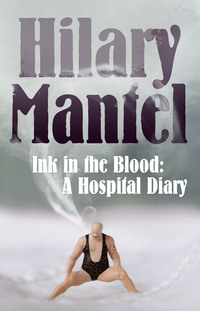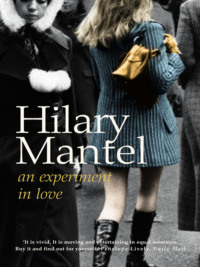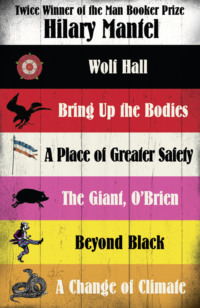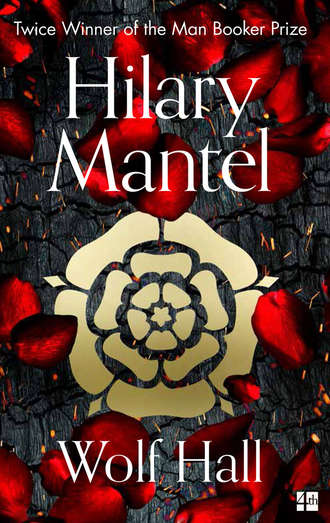
Полная версия
The Wolf Hall Trilogy
Mercy comes in and says, a fever, it could be any fever, we don't have to admit to the sweat … If we all stayed at home, London would come to a standstill.
‘No,’ he says. ‘We must do it. My lord cardinal made these rules and it would not be proper for me to scant them.’
Mercy says, where were you anyway? He looks into her face; he says, you know Little Bilney? I was with him; I warned him, I said he will jump into the fire.
And later? Later I was learning Polish.
Of course. You would be, she says.
She doesn't expect to make sense of it. He never expects to make any better sense of it than it makes now. He knows the whole of the New Testament by heart, but find a text: find a text for this.
Later, when he thinks back to that morning, he will want to catch again that flash of her white cap: though when he turned, no one was there. He would like to picture her with the bustle and warmth of the household behind her, standing in the doorway, saying, ‘Tell me when you are coming home.’ But he can only picture her alone, at the door; and behind her is a wasteland, and a blue-tinged light.
He thinks of their wedding night; her trailing taffeta gown, her little wary gesture of hugging her elbows. Next day she said, ‘That's all right then.’
And smiled. That's all she left him. Liz who never did say much.
For a month he is at home: he reads. He reads his Testament, but he knows what it says. He reads Petrarch whom he loves, reads how he defied the doctors: when they had given him up to fever he lived still, and when they came back in the morning, he was sitting up writing. The poet never trusted any doctor after that; but Liz left him too fast for physician's advice, good or bad, or for the apothecary with his cassia, his galingale, his wormwood, and his printed cards with prayers on.
He has got Niccolò Machiavelli's book, Principalities; it is a Latin edition, shoddily printed in Naples, which seems to have passed through many hands. He thinks of Niccolò on the battlefield; of Niccolò in the torture chamber. He feels he is in the torture chamber but he knows that one day he will find the door out, because it is he who has the key. Someone says to him, what is in your little book? and he says, a few aphorisms, a few truisms, nothing we didn't know before.
Whenever he looks up from his book, Rafe Sadler is there. Rafe is a slight boy, and the game with Richard and the others is to pretend not to see him, and say, ‘I wonder where Rafe is?’ They are as pleased with this joke as a bunch of three-year-olds might be. Rafe's eyes are blue, his hair is sandy-brown, and you couldn't take him for a Cromwell. But still he is a tribute to the man who brought him up: dogged, sardonic, quick on the uptake.
He and Rafe read a book about chess. It is a book printed before he was born, but it has pictures. They frown over them, perfecting their game. For what seems like hours, neither of them makes a move. ‘I was a fool,’ Rafe says, a forefinger resting on the head of a pawn. ‘I should have found you. When they said you weren't at Gray's Inn, I should have known you were.’
‘How could you have known? I'm not reliably where I shouldn't be. Are you moving that pawn, or just patting it?’
‘J'adoube.' Rafe snatches his hand away.
For a long time they sit gazing at their pieces, at the configuration which locks them in place. They see it coming: stalemate. ‘We're too good for each other.’
‘Perhaps we ought to play against other people.’
‘Later. When we can wipe out all-comers.’
Rafe says, ‘Ah, wait!’ He seizes his knight and makes it leap. Then he looks at the result, aghast.
‘Rafe, you are foutu.’
‘Not necessarily.’ Rafe rubs his forehead. ‘You might yet do something stupid.’
‘Right. You live in hope.’
Voices murmur. Sunlight outside. He feels he could almost sleep, but when he sleeps Liz Wykys comes back, cheerful and brisk, and when he wakes he has to learn the lack of her all over again.
From a distant room a child is crying. Footsteps overhead. The crying stops. He picks up his king and looks at the base of it, as if to see how it is made. He murmurs, ‘J'adoube.’ He puts it back where it was.
Anne Cromwell sits with him, as the rain falls, and writes her beginner's Latin in her copy book. By St John's Day she knows all common verbs. She is quicker than her brother and he tells her so. ‘Let me see,’ he says, holding out his hand for her book. He finds that she has written her name over and over, ‘Anne Cromwell, Anne Cromwell …’
News comes from France of the cardinal's triumphs, parades, public Masses and extempore Latin orations. It seems that, once disembarked, he has stood on every high altar in Picardy and granted the worshippers remission of their sins. That's a few thousand Frenchmen free to start all over again.
The king is chiefly at Beaulieu, a house in Essex he has recently bought from Sir Thomas Boleyn, whom he has made Viscount Rochford. All day he hunts, undeterred by the wet weather. In the evening he entertains. The Duke of Suffolk and the Duke of Norfolk join him at private suppers, which they share with the new viscount. The Duke of Suffolk is his old friend and if the king said, knit me some wings so I may fly, he would say, what colour? The Duke of Norfolk is, of course, chief of the Howard family and Boleyn's brother-in-law: a sinewy little twitcher, always twitching after his own advantage.
He does not write to the cardinal to tell him that everybody in England is saying that the king means to marry Anne Boleyn. He doesn't have the news the cardinal wants, so he doesn't write at all. He gets his clerks to do it, to keep the cardinal updated on his legal affairs, his finances. Tell him we are all well here, he says. Tender him my respects and my duty. Tell him how much we would like to see his face.
No one else in their household falls sick. This year London has escaped lightly – or at least, everyone says so. Prayers of thanksgiving are offered in the city churches; or prayers of appeasement, perhaps one should call them? In the little conclaves that meet at night, God's purpose is interrogated. London knows that it sins. As the Bible tells us, ‘A merchant shall hardly keep himself from doing wrong.’ And elsewhere it is stated, ‘He that maketh haste to be rich shall not be innocent.’ It is a sure sign of troubled minds, the habit of quotation. ‘Whom the Lord loveth he correcteth.’
By early September, the plague has run its course and the family is able to gather to pray for Liz. Now she can have the ceremonies that were denied her when she left them so suddenly. Black coats are given to twelve poor men of the parish, the same mourners who would have followed her coffin; and each man in the family has pledged seven years of Masses for her soul. On the day appointed, the weather clears briefly, and there is a chill in the air. ‘The harvest is passed, the summer is ended, and we are not saved.’
The small child Grace wakes in the night and says that she sees her mother in her shroud. She does not cry like a child, noisy and hiccupping, but like a grown woman, weeping tears of dread.
‘All the rivers run into the sea, but the seas are not yet full.’
Morgan Williams shrinks year by year. Today especially he looks small and grey and harassed, as he grips his arm and says, ‘Why are the best taken? Ah, why are they?’ Then, ‘I know you were happy with her, Thomas.’
They are back at Austin Friars, a swarm of women and children and robust men whom mourning hardly takes out of their customary black, the garb of lawyers and merchants, of accountants and brokers. There is his sister, Bet Wellyfed; her two boys, her little daughter Alice. There is Kat; his sisters have their heads together, deciding who shall move in to help out Mercy with the girls, ‘until you marry again, Tom.’
His nieces, two good little girls, still clutch their rosary beads. They stare around them, unsure what they must do next. Ignored, as the people talk over their heads, they lean against the wall, and flick their eyes at each other. Slowly, they slide down the wall, straight-backed, till they are the height of two-year-olds, and balancing on their heels. ‘Alice! Johane!’ someone snaps; slowly they rise, solemn-faced, to their proper heights. Grace approaches them; silently they trap her, take off her cap, shake out her blonde hair and begin to plait it. While the brothers-in-law talk about what the cardinal is doing in France, his attention strays towards her. Grace's eyes grow wide as her cousins draw her hair back tight. Her mouth opens in a silent gape, like a fish's mouth. When one squeak escapes her, it is Liz's sister, the elder Johane, who crosses the room and scoops her up. Watching Johane, he thinks, as he often has, how alike the sisters are: were.
His daughter Anne turns her back on the women, slides her arm into her uncle's. ‘We're talking about the Low Countries trade,’ Morgan tells her.
‘One thing's for sure, Uncle, they won't be pleased in Antwerp if Wolsey signs a treaty with the French.’
‘That's what we're saying to your father. But, oh, he will stick by his cardinal. Come, Thomas! You don't like the French any more than we do.’
He knows, as they do not, how much the cardinal needs the friendship of King François; without one of the major powers of Europe to speak for him, how will the king get his divorce?
‘Treaty of Perpetual Peace? Let's think, when was the last Perpetual Peace? I give it three months.’ It is his brother-in-law Wellyfed who speaks, laughing; and John Williamson, who is Johane's husband, asks will they take bets on it: three months, six? Then he remembers they're at a solemn occasion. ‘Sorry, Tom,’ he says, and breaks into a spasm of coughing.
Johane's voice cuts across it: ‘If the old gamester keeps coughing like this, the winter will finish him off, and then I'll marry you, Tom.’
‘Will you?’
‘Oh, for sure. As long as I get the right piece of paper from Rome.’
The party smile and hide their smiles. They give each other knowing looks. Gregory says, why is that funny? You can't marry your wife's sister, can you? He and his boy cousins go off into a corner to talk about private subjects – Bet's boys Christopher and Will, Kat's boys Richard and Walter – why did they call that child Walter? Did they need a reminder of their father, lurking around after his death, to remind them not to get too happy? The family never meet but he thanks God that Walter's not with them any more. He tells himself he should have more kindness towards his father, but his kindness extends only to paying for Masses for his soul.
In the year before he came back to England for good, he had crossed and recrossed the sea, undecided; he had so many friends in Antwerp, besides good business contacts, and as the city expanded, which it did every year, it seemed more and more the right place to be. If he was homesick, it was for Italy: the light, the language, Tommaso as he'd been there. Venice had cured him of any nostalgia for the banks of the Thames. Florence and Milan had given him ideas more flexible than those of people who'd stayed at home. But something pulled at him – curiosity about who was dead and who'd been born, a desire to see his sisters again, and laugh – one can always laugh somehow – about their upbringing. He had written to Morgan Williams to say, I'm thinking of London next. But don't tell my father. Don't tell him I'm coming home.
During the early months they tried to coax him. Look, Walter's settled down, you wouldn't know him. He's eased back on the drink. Well, he knew it was killing him. He keeps out of the law courts these days. He's even served his turn as churchwarden.
What? he said. And he didn't get drunk on the altar wine? He didn't make off with the candle funds?
Nothing they said could persuade him down to Putney. He waited more than a year, till he was married and a father. Then he felt safe to go.
It was more than twelve years he'd been out of England. He'd been taken aback by the change in people. He left them young and they had softened or sharpened into middle age. The lissom were lean now and dried out. The plump were plumper. Fine features had blurred and softened. Bright eyes were duller. There were some people he didn't recognise at all, not at first glance.
But he would have known Walter anywhere. As his father walked towards him he thought, I'm seeing myself, in twenty, thirty years, if I'm spared. They said that drink had nearly done for him, but he didn't look half-dead. He looked as he had always looked: as if he could knock you down, and might decide to do it. His short strong body had broadened and coarsened. His hair, thick and curling, had hardly a thread of grey. His glance was skewering; small eyes, bright and golden-brown. You need good eyes in a smithy, he used to say. You need good eyes wherever you are, or they'll rob you blind.
‘Where've you been?’ Walter said. Where once he would have sounded angry, he now sounded merely irritated. It was as if his son had been on a message to Mortlake, and had taken his time over it.
‘Oh … here and there,’ he said.
‘You look like a foreigner.’
‘I am a foreigner.’
‘So what have you been doing?’
He could imagine himself saying, ‘This and that.’ He did say it.
‘And what sort of this and that are you doing now?’
‘I'm learning the law.’
‘Law!’ Walter said. ‘If it weren't for the so-called law, we would be lords. Of the manor. And a whole lot of other manors round here.’
That is, he thinks, an interesting point to make. If you get to be a lord by fighting, shouting, being bigger, better, bolder and more shameless than the next man, Walter should be a lord. But it's worse than that; Walter thinks he's entitled. He'd heard it all his childhood: the Cromwells were a rich family once, we had estates. ‘When, where?’ he used to say. Walter would say, ‘Somewhere in the north, up there!’ and yell at him for quibbling. His father didn't like to be disbelieved even when he was telling you an outright lie. ‘So how do we come to such a low place?’ he would ask, and Walter would say it was because of lawyers and cheats and lawyers who are all cheats, and who thieve land away from its owners. Understand it if you can, Walter would say, for I can't – and I'm not stupid, boy. How dare they drag me into court and fine me for running beasts on the so-called common? If all had their own, that would be my common.
Now, if the family's land was in the north, how could that be? No point saying this – in fact, it's the quickest way to get a lesson from Walter's fist. ‘But was there no money?’ he'd persist. ‘What happened to it?’
Just once, when he was sober, Walter had said something that sounded true, and was, by his lights, eloquent: I suppose, he said, I suppose we pissed it away. I suppose once it's gone it's gone. I suppose fortune, when it's lost, it will never visit again.
He thought about it, over the years. On that day when he went back to Putney, he'd asked him, ‘If ever the Cromwells were rich, and I were to go after what's left, would that content you?’
His tone was meant to be soothing but Walter was hard to soothe. ‘Oh yes, and share it out, I suppose? You and bloody Morgan that you're so thick with. That's my money, if all have their own.’
‘It would be family money.’ What are we doing, he thought, quarrelling right off, rowing within five minutes over this nonexistent wealth? ‘You have a grandson now.’ He added, not aloud, ‘And you aren't coming anywhere near him.’
‘Oh, I have those already,’ Walter said. ‘Grandsons. What is she, some Dutch girl?’
He told him about Liz Wykys. Admitting, therefore, that he had been in England long enough to marry and have a child. ‘Caught yourself a rich widow,’ Walter said, sniggering. ‘I suppose that was more important than coming to see me. It would be. I suppose you thought I'd be dead. Lawyer, is it? You were always a talker. A slap in the mouth couldn't cure it.’
‘But God knows you tried.’
‘I suppose you don't admit to the smithy work now. Or helping your uncle John and sleeping among the swill buckets.’
‘Good God, father,’ he'd said, ‘I never rose so high! What are you thinking?’
When he was a little boy and his uncle John was a cook for the great man, he used to run away to Lambeth to the palace, because the chances of getting fed were better. He used to hang around by the entrance nearest the river – Morton hadn't built his big gateway then – and watch the people come and go, asking who was who and recognising them next time by the colours of their clothes and the animals and objects painted on their shields. ‘Don't stand about,’ people bellowed at him, ‘make yourself useful.’
Other children than he made themselves useful in the kitchen by fetching and carrying, their small fingers employed in plucking songbirds and hulling strawberries. Each dinner time the household officers formed up in procession in the passages off the kitchens, and they carried in the tablecloths and the Principal Salt. His uncle John measured the loaves and if they were not just right they were tossed into a basket for the lower household. Those that passed his test he counted as they went in; standing by him, pretending to be his deputy, he learned to count. Into the great hall would go the meats and the cheeses, the sugared fruits and the spiced wafers, to the archbishop's table – he was not a cardinal then. When the scrapings and remnants came back they were divided up. First choice to the kitchen staff. Then to the almshouse and the hospital, the beggars at the gate. What wasn't fit for them would go down the line to the children and the pigs.
Each morning and evening the boys earned their keep by running up the back staircases with beer and bread to put in the cupboards for the young gentlemen who were the cardinal's pages. The pages were of good family. They would wait at table and so become intimate with great men. They would hear their talk and learn from it. When they were not at the table they were learning out of great volumes from their music masters and other masters, who passed up and down the house holding nosegays and pomanders, who spoke in Greek. One of the pages was pointed out to him: Master Thomas More, whom the archbishop himself says will be a great man, so deep his learning already and so pleasant his wit.
One day he brought a wheaten loaf and put it in the cupboard and lingered, and Master Thomas said, ‘Why do you linger?’ But he did not throw anything at him. ‘What is in that great book?’ he asked, and Master Thomas replied, smiling, ‘Words, words, just words.’
Master More is fourteen this year, someone says, and is to go to Oxford. He doesn't know where Oxford is, or whether he wants to go there or has just been sent. A boy can be sent; and Master Thomas is not yet a man.
Fourteen is twice seven. Am I seven? he asks. Don't just say yes. Tell me am I? His father says, for God's sake, Kat, make him up a birthday. Tell him anything, but keep him quiet.
When his father says, I'm sick of the sight of you, he leaves Putney and sets off to Lambeth. When Uncle John says, we have plenty of boys this week, and the devil finds work for idle hands, he sets off back to Putney. Sometimes he gets a present to take home. Sometimes it is a brace of pigeons with their feet tied together, and gaping bloody beaks. He walks along the riverbank whirling them about his head, and they look as if they are flying, till somebody shouts at him, stop that! He can't do anything without someone shouting. Is it any wonder, John says, when you are into any mischief going, prone to giving back answers and always reliably to be found where you shouldn't be?
In a small cold room off the kitchen passages there is a woman called Isabella, who makes marzipan figures, for the archbishop and his friends to make plays with after supper. Some of the figures are heroes, such as Prince Alexander, Prince Caesar. Some are saints; today I am making St Thomas, she says. One day she makes marzipan beasts and gives him a lion. You can eat it, she says; he would rather keep it, but Isabella says it will soon fall to pieces. She says, ‘Haven't you got a mother?’
He learns to read from the scribbled orders for wheat flour or dried beans, for barley and for ducks' eggs, that come out of the stewards' pantries. For Walter, the point of being able to read is to take advantage of people who can't; for the same purpose one must learn to write. So his father sends him to the priest. But again he is always in the wrong, for priests have such strange rules; he should come to the lesson specially, not on his way from whatever else he is doing, not carrying a toad in a bag, or knives that want sharpening, and not cut and bruised either, from one of those doors (doors called Walter) that he is always walking into. The priest shouts, and forgets to feed him, so he takes off to Lambeth again.
On the days when he turns up in Putney, his father says, where by the sweet saints have you been: unless he's busy inside, on top of a stepmother. Some of the stepmothers last such a short time that his father's done with them and kicked them out by the time he gets home, but Kat and Bet tell him about them, screeching with laughter. Once when he comes in, dirty and wet, that day's stepmother says, ‘Who does this boy belong to?’ and tries to kick him out into the yard.
One day when he is nearly home he finds the first Bella lying in the street, and he sees that nobody wants her. She is no longer than a small-sized rat and so shocked and cold that she doesn't even cry. He carries her home in one hand, and in the other a small cheese wrapped in sage leaves.
The dog dies. His sister Bet says, you can get another. He looks in the street but never finds one. There are dogs, but they belong to somebody.
It can take a long time to get to Putney from Lambeth and sometimes he eats the present, if it's not raw. But if he only gets a cabbage, he kicks it and rolls it and thrashes it till it is utterly, utterly destroyed.
At Lambeth he follows the stewards around and when they say a number he remembers it; so people say, if you haven't time to write it down, just tell John's nephew. He will cast an eye on a sack of whatever's been ordered in, then warn his uncle to check if it's short weight.
At night at Lambeth, when it's still light and all the pots have been scoured, the boys go outside on to the cobbles and play at football. Their shouts rise into the air. They curse and barge into each other, and till somebody yells to stop, they fight with their fists and sometimes bite each other. From the open window above, the young gentlemen sing a part-song in the high careful voices they learn.
Sometimes the face of Master Thomas More appears. He waves to him, but Master Thomas looks down without recognition at the children below. He smiles impartially; his white scholar's hand draws close the shutter. The moon rises. The pages go to their truckle-beds. The kitchen children wrap themselves in sacking and sleep by the hearth.
He remembers one night in summer when the footballers had stood silent, looking up. It was dusk. The note from a single recorder wavered in the air, thin and piercing. A blackbird picked up the note, and sang from a bush by the water gate. A boatman whistled back from the river.
1527: when the cardinal comes back from France, he immediately begins ordering up banquets. French ambassadors are expected, to set the seal on his concordat. Nothing, he says, nothing, will be too good for these gentlemen.
The court leaves Beaulieu on 27 August. Soon afterwards, Henry meets the returned cardinal, face-to-face for the first time since early June. ‘You will hear that the king's reception of me was cold,’ Wolsey says, ‘but I can tell you it was not. She – Lady Anne – was present … this is true.’
On the face of it, a large part of his mission has been a failure. The cardinals would not meet him at Avignon: made the excuse that they didn't want to go south in the heat. ‘But now,’ he says, ‘I have a better plan. I will ask the Pope to send me a co-legate, and I will try the king's matter in England.’



